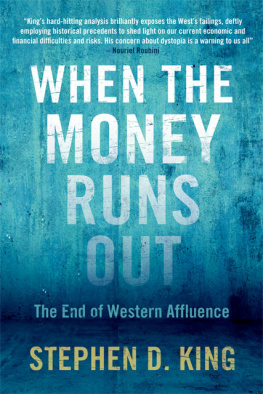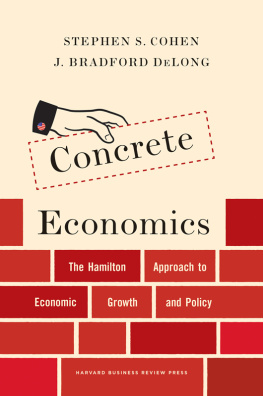ECONOMIC PERSUASIONS
Studies in Rhetoric and Culture
Edited by Ivo Strecker, Johannes Gutenberg University Mainz and Addis Ababa University, Stephen Tyler, Rice University, and Robert Hariman, Northwestern University
Our minds are filled with images and ideas, but these remain unstable and incomplete as long as we do not manage to persuade both ourselves and others of their meanings. It is this inward and outward rhetoric which allows us to give some kind of shape and structure to our understanding of the world and which becomes central to the formation of individual and collective consciousness. This series is dedicated to the study of the interaction of rhetoric and culture and focuses on the concrete practices of discourse in which and through which the diverse and often also fantastic patterns of cultureincluding our ownare created, maintained, and contested.
Volume 1
Culture & Rhetoric
Edited by Ivo Strecker and Stephen Tyler
Volume 2
Culture, Rhetoric, and the Vicissitudes of Life
Edited by Michael Carrithers
Volume 3
Economic Persuasions
Edited by Stephen Gudeman
ECONOMIC PERSUASIONS
Edited by
STEPHEN GUDEMAN
First published in 2009 by
Berghahn Books
www.berghahnbooks.com
2009, 2012 Stephen Gudeman
First ebook edition published in 2011
First paperback edition published in 2012
All rights reserved. Except for the quotation of short passages
for the purposes of criticism and review, no part of this book
may be reproduced in any form or by any means, electronic or
mechanical, including photocopying, recording, or any information
storage and retrieval system now known or to be invented,
without written permission of the publisher.
Library of Congress Cataloging-in-Publication Data
/ edited by Stephen Gudeman.
p. cm. (Studies in rhetoric and culture ; v. 3)
Includes bibliographical references and index.
ISBN 978-1-84545-436-4 (hbk.) -- ISBN 978-0-85745-663-2 (pbk.) -- ISBN 978-1-84545-926-0 (ebk.)
1. Economic anthropology. 2. RhetoricSocial aspects. 3. Persuasion (Rhetoric)
I. Gudeman, Stephen.
GN448.2.E36 2009
306.3dc22
2009012947
British Library Cataloguing in Publication Data
A catalogue record for this book is available from the British Library
ISBN 978-1-84545-436-4 hardback
ISBN 978-0-85745-663-2 paperback
ISBN 978-1-84545-926-0 ebook
CONTENTS
Stephen Gudeman
James G. Carrier
Richard Swedberg
William Milberg
Stephen Gudeman
Metin M. Cosgel
Jane I. Guyer with LaRay Denzer
Nurit Bird-David and Asaf Darr
Keith Hart
Ruben George Oliven
Arjo Klamer
PREFACE

THE CONTRIBUTIONS TO ECONOMIC PERSUASIONS, which is the third volume in the Studies in Rhetoric and Culture series, were originally presented in July 2005 at the University of Mainz as part of the Rhetoric Culture Project. An initial conference on rhetoric culture theory, inspired and led by Ivo Strecker, was convened during 2002 at Mainz. Attended by anthropologists and scholars from related disciplines, it became the springboard for a subsequent series of conferences on topics such as religion, social relations, politics, and economics. This volumes editor was a participant in the initial conference, but he harbored reservations about assembling a group of scholars interested in addressing the intersection of rhetoric, anthropology, and economics. The home of rhetoric seemed to be in politics, language, semiotics, and expressive culture, and not in anthropology or in its overlaps with economics. These doubts were unfounded, because it proved very easy to convene a group of scholars around the idea of persuasion and economy. Our diverse group included anthropologists, economists, and a sociologist; their topics ranged from ethnography to theory, and from history, to texts, to art. The many postings, discussions, and dialogues on rhetoric culture that emerged after the initial planning conference inspired our contributors along with the opportunity of trying to develop, with like-minded scholars, a different way of thinking about economy.
A large, intellectual venture, such as the rhetoric culture series, comes to fruition through the commitment, encouragement, and hard work of a group of individuals. Ivo Strecker, influenced by the work of Stephen Tyler, developed the idea of an encompassing rhetoric culture project, and our contribution would not have emerged without his unflagging support and encouragement. We also owe special thanks to Felix Girke, who co-organized the economics conference with this editor, and who plans to edit a second volume on economics and rhetoric. Christian Meyer, Jean Lydall, and Anna-Maria Brandstetter contributed in many ways to the success of our meetings in Mainz. The Volkswagen Foundation generously funded our conference with the others, and we were especially pleased that the publisher, Marion Berghahn, was able to attend our conference sessions.
I close with thanks to our contributors, who were faced with a new challenge in thinking about economy in terms of rhetoric and culture. The study of market economies traditionally has been the province of economists just as everyday small-scale economies have provided the grounds for anthropological research: a breach separated the two fields so that a convincing comparative economics never developed. The essays that follow help to bridge this gap and offer an exciting way of comparing economies.
CHAPTER 1
INTRODUCTION
Stephen Gudeman
AS THE TRANSITION FROM SOCIALISM to market economy gathered speed in the early 1990s, many people proclaimed the final success of capitalism as a practice and neoliberal economics as a science. But with the uneven achievements of the transition, the deepening problems of development, the continuation of boom and bust cycles in market societies, persistent unemployment, widening of the wealth gap, and expressions of resistance, the discipline of economics is no longer seen as a mirror of reality or as a unified science. How should we understand economics and, more broadly, the organization and disorganization of material life?
In the meanwhile, economists are crossing disciplinary boundaries in impressive numbers and attempting to apply their models to an ever-increasing range of social phenomena. Some economists also have discovered anthropological notions such as culture and figurative speech. Today, economists speak about social and cultural capital, as well as signals and information. Even the hallowed and notoriously ambiguous anthropological term, gift, (as well as reciprocity) has been encompassed within the rationalistic rhetoric of economics; however, anthropologists and economists use the terms very differently. For their part, anthropologists have not reached into this cross-disciplinary space nor fully used their ethnographic and analytical tools to offer alternative interpretations. Given its notion of culture, what does anthropology contribute to our understanding, explanation, and predictions about economies and economics?















